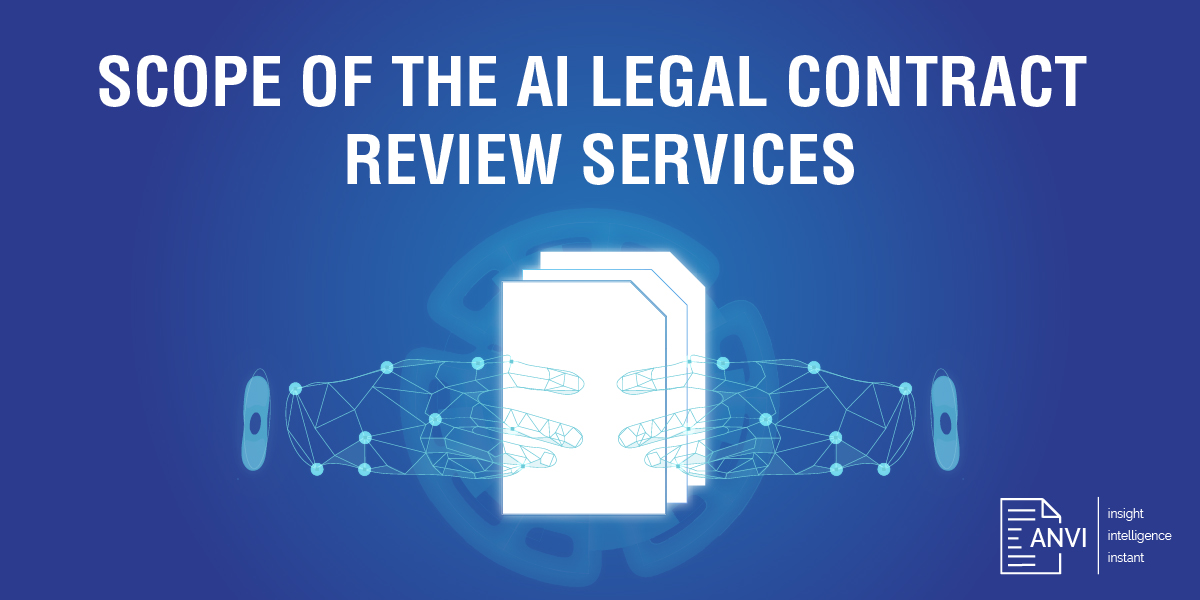
Scope Of Artificial Intelligence In Contract Review Services
The legal technology market is full of artificial intelligence tools that can be used to perform a number of contract-related tasks, from identifying and extracting clauses (where software extracts specific types of clauses to beyond those identified during due diligence.) to the contract review (where the software is used to analyze a contract against a standard) and to management. However, with variety comes the choice, and many companies delay the adoption of new systems simply because they don’t have the time or resources to make the change.
What are the benefits for legal teams?
Artificial intelligence technology has the potential to truly improve the way businesses and internal legal departments manage contracts. Instead of relying on methods of drafting, collaboration, storage and monitoring of ad hoc contracts, professionals can increase their control by centralizing contract management via a single artificial intelligence tool and automating tasks routine in the life cycle of contract management. . This includes everything from automating the creation and review of contracts to the electronic signing and archiving of completed contracts.
In terms of design, artificial intelligence software can provide standard contract templates guaranteeing the most precise and up-to-date language. In addition, tools such as Anvi Legal AI machine learning can be used to assess language by adding new contracts to the system and periodically monitoring old contracts for confidential data.
Revising manual contracts is a daunting task that can keep legal teams alert for long periods of time. Add to that data security, and it’s no surprise that many professionals are turning to new technologies to relieve them of the burden. Legal technology tools such as Anvi Legal can automate almost the entire review process, read contracts, identify predetermined concepts and present information in an easy-to-use format. In fact, many companies enjoy the benefits of Anvi Legal, not as a freelance analyst but as an exam assistant. Although variables such as poor scanning quality or unusual word clauses are always problematic, the system directs users to the right place in a contract to refine and analyze their own results.
Contract management is also traditionally a complex and laborious activity, which obliges professionals to respect the terms, conditions, results and conditions of each contract under their supervision. Businesses can now upload their contracts to a central repository, where the AI software automatically marks each document based on a set of predetermined criteria (for example, start and end dates, contracting parties, and type of contract). This allows the platform to provide a snapshot of current workflows and upcoming events, which means tracking deadlines is no longer one of the most difficult parts of contract management.
Implement the right software for your team.
Convinced? Now comes the main challenge. While adopting artificial intelligence technology may seem perfectly logical, encouraging colleagues to adopt new practices and persuading stakeholders or customers to pay the cost may not be so easy.
Needless to say, the first step is to conduct in-depth research on the best possible solution. With so many products to choose from, there is not a single package. With key considerations ranging from ease of use and advanced search capabilities to integration with related business applications and customization potential, professionals must determine exactly what they need the software, as it varies with size, nature and business process. major issues in your current contract management system. It makes no sense to try to solve hypothetical problems. Instead, professionals must identify and focus on the most important problems they face. In addition, they must take into account the needs of other departments. The more people benefit from technology, the more likely the company is to invest.
Once you have identified the best software for your needs (and those of your colleagues), stakeholder education will be essential to address any concerns that may prevent you from giving the green light. In addition, you should think carefully about the best time to make a change. Many legal teams go through an arduous process of reviewing and selecting software to fail during implementation. Therefore, it is important to ensure that the appropriate support structure is in place after the technology is installed. It is essential to have a solid team to supervise the project, respond to all workflows and provide training to users. If you can obtain additional assistance from the software provider (for example, additional training or step-by-step instructions), it is even better.
Follow a changing practice
While choosing the right contract management program will vary according to the company’s needs, one thing is certain: the adoption of legal technology is a necessary step. AI opens the door to more agile processes, making contract management more efficient and profitable, and freeing up time for lawyers to focus on other, more interesting, areas of their practice.
With a growing number of companies and internal lawyers that turn to artificial intelligence, smart and profitable contract management will probably become the norm, and you won’t want to be left behind. In fact, increasing demands for efficiency are unlikely to decrease; therefore, it is up to the legal teams to keep abreast of new technologies and processes to advance the competition. It goes without saying that no legal team can afford to lose business simply because it cannot offer the same innovative tools as its competitors or, worse, because its contract management system is a disaster.
The post Scope of Artificial Intelligence in contract review services appeared first on anvilegal.